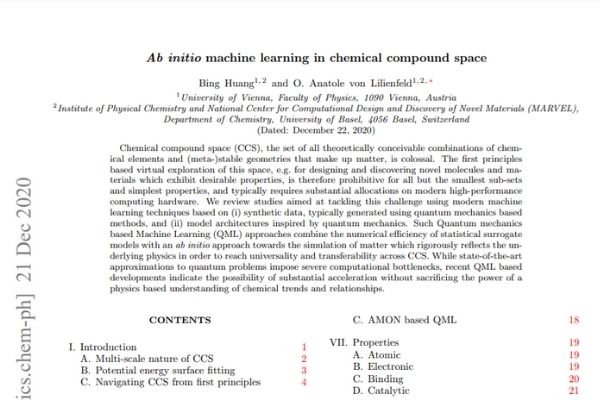Chemical Physics (2020) https://arxiv.org/abs/2012.07502 as part of the special issue "Machine Learning in Chemistry" of Chemical Reviews
Authors: Bing Huang, O. Anatole von Lilienfeld
Chemical compound space (CCS), the set of all theoretically conceivable combinations of chemical elements and (meta-)stable geometries that make up matter, is colossal. The first principles based virtual exploration of this space, e.g.~for designing and discovering novel molecules and materials which exhibit desirable properties, is therefore prohibitive for all but the smallest sub-sets and simplest properties, and typically requires substantial allocations on modern high-performance computing hardware. We review studies aimed at tackling this challenge using modern machine learning techniques based on (i) synthetic data, typically generated using quantum mechanics based methods, and (ii) model architectures inspired by quantum mechanics. Such Quantum mechanics based Machine Learning (QML) approaches combine the numerical efficiency of statistical surrogate models with an {\em ab initio} approach towards the simulation of matter which rigorously reflects the underlying physics in order to reach universality and transferability across CCS. While state-of-the-art approximations to quantum problems impose severe computational bottlenecks, recent QML based developments indicate the possibility of substantial acceleration without sacrificing the power of a physics based understanding of chemical trends and relationships.
Comments: To appear as part of the special issue "Machine Learning in Chemistry" of Chemical Reviews
Subjects: Chemical Physics (physics.chem-ph)
Cite as: arXiv:2012.07502 [physics.chem-ph]
(or arXiv:2012.07502v3 [physics.chem-ph] for this version)




